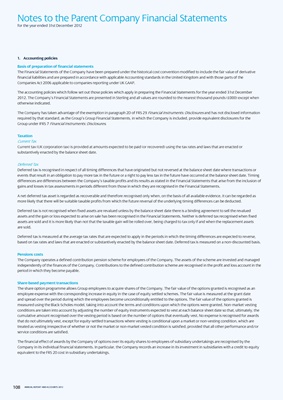
Notes to the Parent Company Financial Statements
for the year ended 31st December 2012
1. Accounting policies
Basis of preparation of financial statements
The Financial Statements of the Company have been prepared under the historical cost convention modified to include the fair value of derivative
financial liabilities and are prepared in accordance with applicable Accounting standards in the United Kingdom and with those parts of the
Companies Act 2006 applicable to companies reporting under UK GAAP.
The accounting policies which follow set out those policies which apply in preparing the Financial Statements for the year ended 31st December
2012. The Company’s Financial Statements are presented in Sterling and all values are rounded to the nearest thousand pounds (£000) except when
otherwise indicated.
The Company has taken advantage of the exemption in paragraph 2D of FRS 29 Financial Instruments: Disclosures and has not disclosed information
required by that standard, as the Group’s Group Financial Statements, in which the Company is included, provide equivalent disclosures for the
Group under IFRS 7 Financial Instruments: Disclosures.
taxation
Current Tax
Current tax (UK corporation tax) is provided at amounts expected to be paid (or recovered) using the tax rates and laws that are enacted or
substantively enacted by the balance sheet date.
Deferred Tax
Deferred tax is recognised in respect of all timing differences that have originated but not reversed at the balance sheet date where transactions or
events that result in an obligation to pay more tax in the future or a right to pay less tax in the future have occurred at the balance sheet date. Timing
differences are differences between the Company’s taxable profits and its results as stated in the Financial Statements that arise from the inclusion of
gains and losses in tax assessments in periods different from those in which they are recognised in the Financial Statements.
A net deferred tax asset is regarded as recoverable and therefore recognised only when, on the basis of all available evidence, it can be regarded as
more likely that there will be suitable taxable profits from which the future reversal of the underlying timing differences can be deducted.
Deferred tax is not recognised when fixed assets are revalued unless by the balance sheet date there is a binding agreement to sell the revalued
assets and the gain or loss expected to arise on sale has been recognised in the Financial Statements. Neither is deferred tax recognised when fixed
assets are sold and it is more likely than not that the taxable gain will be rolled over, being charged to tax only if and when the replacement assets
are sold.
Deferred tax is measured at the average tax rates that are expected to apply in the periods in which the timing differences are expected to reverse,
based on tax rates and laws that are enacted or substantively enacted by the balance sheet date. Deferred tax is measured on a non-discounted basis.
Pensions costs
The Company operates a defined contribution pension scheme for employees of the Company. The assets of the scheme are invested and managed
independently of the finances of the Company. Contributions to the defined contribution scheme are recognised in the profit and loss account in the
period in which they become payable.
Share-based payment transactions
The share option programme allows Group employees to acquire shares of the Company. The fair value of the options granted is recognised as an
employee expense with the corresponding increase in equity in the case of equity settled schemes. The fair value is measured at the grant date
and spread over the period during which the employees become unconditionally entitled to the options. The fair value of the options granted is
measured using the Black-Scholes model, taking into account the terms and conditions upon which the options were granted. Non-market vesting
conditions are taken into account by adjusting the number of equity instruments expected to vest at each balance sheet date so that, ultimately, the
cumulative amount recognised over the vesting period is based on the number of options that eventually vest. No expense is recognised for awards
that do not ultimately vest, except for equity-settled transactions where vesting is conditional upon a market or non-vesting condition, which are
treated as vesting irrespective of whether or not the market or non-market vested condition is satisfied, provided that all other performance and/or
service conditions are satisfied.
The financial effect of awards by the Company of options over its equity shares to employees of subsidiary undertakings are recognised by the
Company in its individual financial statements. In particular, the Company records an increase in its investment in subsidiaries with a credit to equity
equivalent to the FRS 20 cost in subsidiary undertakings.
108 ANNUAL REPORT AND ACCOUNTS 2012